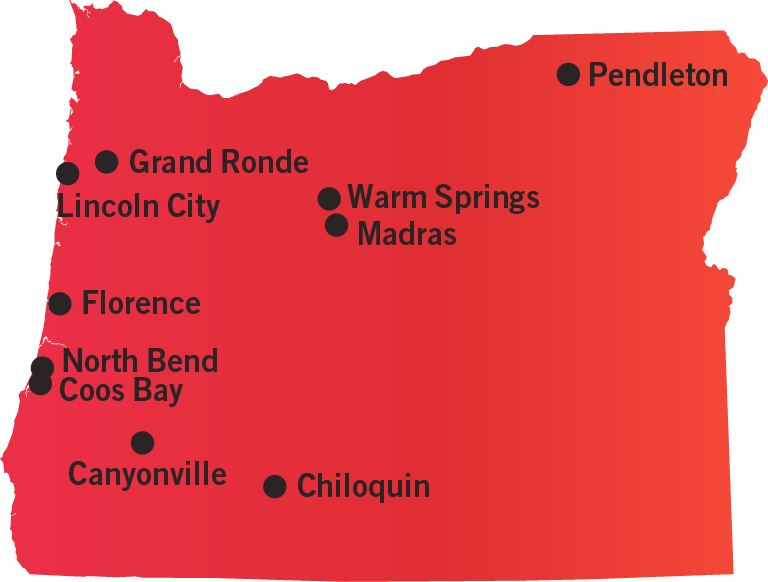State of Play
Explore the national and state-by-state impact of the casino gaming industry, as well as key regulatory and statutory requirements in each state.

-
Number of Casinos 10
-
Economic Impact $2.33 Billion
-
Jobs Supported 15,609
-
Tax Impact & Tribal Revenue Share $410.4 Million
-
Gross Gaming Revenue $64.3 Million (2023 Commercial Sports Betting)
Size of circle indicates number of casinos in the area.
All location data is as of Dec. 31, 2023.

-
Number of Casinos 10
-
Economic Impact $1.61 Billion
-
Jobs Supported 12,477
-
Tax Impact & Tribal Revenue Share $318.0 Million
-
Gross Gaming Revenue $510.4 Million (2016)
Size of circle indicates number of casinos in the area.
All location data is as of Dec. 31, 2023.
There are nine compacted gaming tribes in Oregon:
- Burns Paiute Tribe;
- Cow Creek Band of Umpqua Tribe of Indians;
- Klamath Tribes, Modocs & Yahooskin, Coos;
- Lower Umpqua & Siuslaw Indians;
- Confederated Tribes of Siletz;
- Coquille Indian Tribe;
- Confederated Tribes of the Umatilla Indian Reservation;
- Confederated Tribes of Warm Springs; and
- Confederated Tribes of Grande Ronde Community.
Tribal casinos in Oregon are regulated by the tribe and the state. The Tribe is required to set up multiple departments to oversee tribal gaming operations.
To become licensed in Class III gaming activities, the tribe must submit for approval to the tribal gaming commission. The commission then provides the rules to the Oregon State Police who are in charge of governing the conduct of the activities in the tribal casino.
There are limits on the amount of gaming machines at tribal casinos in Oregon. However, once a tribe has reached its limit on gaming machines, the compact specifies it can be renegotiated to allot for more machines.
The compacts are effective in perpetuity. However, both the state and tribes can request to renegotiate the compacts at any time.
AVAILABLE GAMING LICENSES
The tribes agree to pay for the cost of performance by Oregon State Police of activities authorized under the compacts, including associated overhead.
REVENUE SHARE
The compacts require the tribes to “pay the reasonable cost of necessary street, road or highway improvements determined to be necessary on the basis of a traffic impact study and Oregon Department of Transportation requirements.” The tribes are not responsible for improvements unless the improvements are necessary to correct traffic impacts attributable to the gaming facility.
The tribal-state gaming compacts also require the creation and maintenance of a community benefit fund. The calculation of the fund contribution varies slightly according to each compact. However, each tribe pays approximately six percent of the previous year’s net income. Contributions to the community fund must be made annually.
Grants from the community benefit fund may be made to charitable organizations within certain counties specified in the compact, or to “local government bodies within the county or counties within whose boundaries the tribes’ reservation is located.”
TAX PROMOTIONAL CREDITS
Promotional credits do not affect revenue sharing in the state.
WITHHOLDINGS ON WINNINGS
The tribes must report to the Oregon Department of Revenue gambling winnings paid to any person subject to Oregon personal income tax on those winnings whenever the tribes would be required to report those winnings to the IRS. In addition, federal law may require tribal casinos to issue a W-2G form to persons and may withhold winnings if certain conditions are met. For more information click here.
STATE USE OF REVENUE
The state uses revenue from tribal gaming for street, road or highway improvements and for grants to charitable organizations or local government bodies within certain counties.
TRIBAL USE OF REVENUE
Requirements as described in IGRA.
STATUTORY FUNDING REQUIREMENT
None
SELF-EXCLUSION
None
COMPLIMENTARY ALCOHOLIC DRINKS
None
ADVERTISING RESTRICTIONS
None
ON-PREMISE DISPLAY REQUIREMENT
None
AGE RESTRICTIONS
No person under the age of 21 shall be allowed to participate in any Class III gaming.
OPERATION ON HOLIDAYS
Yes
TESTING REQUIREMENTS
The tribal gaming commission must inspect and test gaming devices for compliance with standards set by the tribal gaming commission.
ANTI-MONEY LAUNDERING REQUIREMENTS
Federal compliance requirements under the Bank Secrecy Act.
SHIPPING REQUIREMENTS
Federal shipping requirements under the Johnson Act.
RESTRICTIONS ON POLITICAL CONTRIBUTIONS
Yes
CREDIT OFFERED TO PATRONS
No
SMOKING BANS
No
CASHLESS GAMING & ALTERNATIVE PAYMENTS
No. Oregon tribal regulations do not prohibit specific payment types. Additionally, Oregon does not accept cryptocurrency as a form of payment.
AUTHORIZED OPERATORS
Tribal casinos and the Oregon Lottery through kiosks, retailers & online
MOBILE/ONLINE
Allowed statewide through Lottery
TAX RATE
Not available
INITIAL LICENSING FEE
Not available
LICENSE RENEWAL FEE
Not available
AMATEUR RESTRICTIONS
Collegiate teams and events through the Lottery
TAX ON PROMOTIONAL CREDITS
No
AGE RESTRICTIONS
Must be 21 years old.